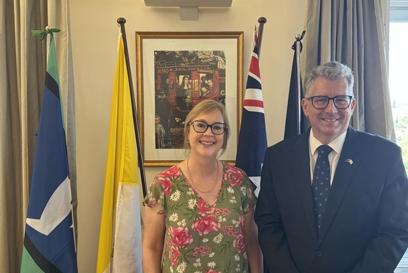Caritas Australia launched its Lebanon Emergency Appeal in response to an economic crisis identified by the World Bank as one of the worst in 150 years.
Partners in the region now report that increased hostilities between Israeli forces and Hezbollah have resulted in numerous casualties, displacement of civilians, and extensive damage to infrastructure.
The ongoing conflict has displaced over 98,750 individuals from southern Lebanon, adding to Lebanon’s status as home to the largest number of refugees per capita in the world. The total number of casualties in Lebanon since the escalation began in October 2023 has reached 1,953, including 481 fatalities.
Over 3,000 buildings have been damaged or destroyed, 1,700 hectares of farmland damaged, and 340,000 farm animals killed, further impacting scarce resources. Significant damage has also been reported to water, electricity, and telecommunications infrastructure, as well as roads and bridges, complicating humanitarian relief efforts.
A recession and record inflation began in Lebanon in 2019, and has since been exacerbated by Covid-19, the Russian Invasion of Ukraine, the devastating explosion of the Port of Beirut in 2020, and now conflict between Hezbollah and the Israeli forces. In 2023 food price inflation in Lebanon was among the worst in the world in, sitting at 350%. One in five people now face acute food insecurity, and over 80% of the population lives in poverty, compared to 42% in 2019.
Sally Thomas, Humanitarian Emergencies Lead at Caritas Australia said, “Economically the situation in Lebanon was already dire before this conflict. We saw after the explosion in the Port of Beirut that the country simply cannot recover from disruption to the flow of resources, with the cost of purchasing essentials having skyrocketed by percentages in the hundreds after that incident.”
“That is an incomprehensible increase – Australians spend on average $160 per week on food, so imagine that increasing to $560 in just one year, and that is reflective of what happened in Lebanon in last year. Most previously self-sufficient families are now facing a similar level of need to the nation’s sizeable refugee population and this conflict, bringing damage to resources and infrastructure, will only make things worse.”
The Caritas Australia Lebanon Emergency Appeal supports Caritas Lebanon across:
- 37 centres providing social support in the form of rent and cash assistance for bills and school fees.
- 10 primary healthcare centres and 8 mobile clinics providing diagnosis services, treatment, mental health services and distributing medications.
- Agreements across over 80 hospitals covering part or all hospital fees for vulnerable people.
- Mobile clinics focused on supporting people living with a disability and the elderly.
- 3 shelters for women seeking protection and escaping gender-based violence, providing shelter, food, medical, legal, and psychosocial support as well as life skills and livelihood training.

















